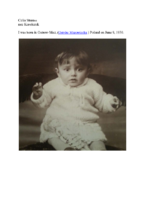Search the Special Collections and Archives Portal
Search Results
Bob Fisher oral history interview
Identifier
Abstract
Oral history interview with Robert Fisher conducted by Barbara Tabach on January 08, 2015 for the Southern Nevada Jewish Heritage Project. In this interview, Fisher discusses his childhood in Minnesota, and the large role Judaism played in his upbringing. He speaks at length about his involvement with United Synagogue of Conservative Judaism over the years, including as regional director of the United Synagogue Youth Far West Region, which took him from Minnesota to California. He talks about his time in Los Angeles, California, and later, about his life in Las Vegas, Nevada, including his broadcasting career as well as involvement with Midbar Kodesh Temple.
Archival Collection
Helen Smith oral history interview
Identifier
Abstract
Oral history interview with Helen Smith conducted by Claytee D. White on February 20, 2007 for the Boyer Early Las Vegas Oral History Project. In this interview, Smith discusses her personal history and moving to Las Vegas, Nevada in 1956. She then talks about her employment at Southern Nevada Memorial Hospital and the change to University Medical Center (UMC). Smith recalls an air conditioning business she co-owned with her husband at the time, and the activities she did as a member of Daughters of the Nile, a women's community service organization. Lastly, she discusses education and the general changes in Las Vegas.
Archival Collection
Susan and Holly Carratelli oral history interviews
Identifier
Abstract
Oral history interviews with Susan and Holly Carratelli conducted by Dennis McBride on June 24 and 26, 1999 for the Las Vegas Gay Archives Oral History Project. In the interviews, Susan and Holly recall first meeting during the planning for the 1994 National Coming Out Day event in Las Vegas, Nevada. They discuss what they value in a relationship, their past relationship experiences, and their involvement with the Gay and Lesbian Community Center and Metropolitan Community Church. Other subjects they cover include their marriage, anecdotes about living together, having children, their daily routine, and conflicting inter-community perceptions between gay men and women in Las Vegas.
Archival Collection
Jacqueline MacFarlane oral history interview
Identifier
Abstract
Oral history interview with Jacqueline MacFarlane conducted by Claytee D. White on February 04, 2010 for the Boyer Early Las Vegas Oral History Project. In this interview Jacqueline MacFarlane discusses her early childhood in Las Vegas, Nevada, her move to rural Nevada because of the Great Depression, her move back to Las Vegas, and meeting her husband David MacFarlane, an Air Force Cadet, at the Nellis Air force Base. She then discusses family life, Las Vegas in the 1950s and 1960s, and the various jobs she held on the Las Vegas Strip.
Archival Collection
Ethel S. Hatch oral history interview
Identifier
Abstract
Oral history interview with Ethel S. Hatch conducted by P. Kohlman on November 24, 1975 for the Ralph Roske Oral History Project on Early Las Vegas. This interview covers the history of Las Vegas from 1939 to 1975. Mrs. Hatch also talks about ranching in Nevada, Rex Bell, development on the Strip, the first hotels, and early local shopping culture. The interview concludes with discussion surrounding tree-lined streets, the Helldorado Club, and Fremont Street.
Archival Collection
An Interview with Judith Lee Johnson Jones
Identifier
Abstract
Oral history interview with Judith Lee Johnson Jones conducted by Claytee D. White on February 22, 2007 for the Boyer Early Las Vegas Oral History Project. Johnson Jones discusses winning a contest that allowed her to be a showgirl at the Sands Hotel and Casino when she was seventeen, receiving a college degree in Houston, Texas, and performing in the Elvis movie “Viva Las Vegas.” She also talks about her twenty-nine-year career in education.
Archival Collection
Joseph Kine oral history interview
Identifier
Abstract
Oral history interview with Joseph Kine conducted by James Greene on December 19, 1974 for the Ralph Roske Oral History Project on Early Las Vegas. This interview covers the early days of Boulder City, Nevada from the perspective of an old-timer. Mrs. Kine is also present during the interview. They discuss education, home, and family life, in Boulder City.
Archival Collection

Eric Mendoza oral history interview: transcript
Date
Archival Collection
Description
Oral history interview with Eric Mendoza conducted by Holly O'Donnell on November 29, 2021 for Reflections: The Las Vegas Asian American and Pacific Islander Oral History Project. In this interview, Eric Mendoza shares his family's chain migration history from Manila, Philippines to the United States and his difficult immigration and naturalization process once arriving in America in 1996. He talks about what brought him to live in Las Vegas, Nevada, his education and professional pursuits, what his life is like in the United States compared to that of the Philippines, and the lives of his eight siblings. Eric Mendoza discusses the historical past of the Philippines, the infrastructure in place there, and government corruption. He also speaks to Filipino traditions and festivals, food and customs, his cultural identity, and assimilating to American culture.
Text

Biographical essay by Celia Strauss, 2014
Date
Archival Collection
Description
Celia Strauss describes her family history in Poland and fleeing the Nazis, narrowly escaping being captured or shot several times. She and her family came to the United States in 1947.
Text
Julian Escutia-Rodriguez (Mexican Consulate of Las Vegas) oral history interview conducted by Magdalena Martinez and Elia Del Carmen Solano-Patricio: transcript
Date
Archival Collection
Description
From the Lincy Institute "Perspectives from the COVID-19 Pandemic" Oral History Project (MS-01178) -- Community organization interviews file.
Text
